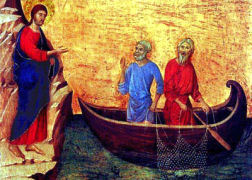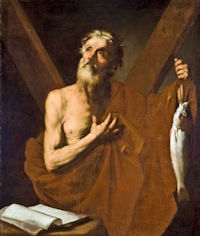» Enjoy our Liturgical Seasons series of e-books!
![]()
Today the Church celebrates the Feast of St. Andrew the Apostle, a native of Bethsaida in Galilee, a fisherman by trade, and a former disciple of John the Baptist. He was the one who introduced his brother Peter to Jesus, saying, "We have found the Messiah." Overshadowed henceforth by his brother, Andrew nevertheless appears again in the Gospels as introducing souls to Christ. After Pentecost, Andrew took up the apostolate on a much wider scale, and is said to have been martyred at Patras in southern Greece on a cross which was in the form of an "X". This type of cross has long been known as "St. Andrew's cross."
St. Andrew's feast is a signal of the beginning of Advent (plus or minus a few days). Beginning on his feast, the following beautiful prayer is traditionally recited fifteen times a day until Christmas. This is a very meditative prayer that helps us increase our awareness of the real focus of Christmas and helps us prepare ourselves spiritually for His coming.
+Hail and blessed be the hour and moment in which the Son of God was born of the most pure Virgin Mary, at midnight, in Bethlehem, in piercing cold. In that hour vouchsafe, O my God! to hear my prayer and grant my desires, [here mention your request] through the merits of Our Saviour Jesus Christ, and of His blessed Mother. Amen.
![]() Jesse Tree, Day 4 ~ Noah
Jesse Tree, Day 4 ~ Noah
Jesse Tree Overview
St. Andrew (or Andreas) the Apostle
 Andrew, Peter's brother, and John were the first disciples to follow the Lord. With tender delicacy the Gospel (John 1:35-42) describes their first meeting with Jesus. Andrew did not belong to the inner circle of the apostles, Peter, James and John, and the evangelists narrate nothing extraordinary about him (John 6:8); but tradition (resting on apocrpyhal Acts) extols his great love of the Cross and of the Savior; and the Church distinguishes him both in the Mass (his name occurs in the Canon and in the Libera since the time of Pope St. Gregory I who had a special devotion to him) and in the Breviary.
Andrew, Peter's brother, and John were the first disciples to follow the Lord. With tender delicacy the Gospel (John 1:35-42) describes their first meeting with Jesus. Andrew did not belong to the inner circle of the apostles, Peter, James and John, and the evangelists narrate nothing extraordinary about him (John 6:8); but tradition (resting on apocrpyhal Acts) extols his great love of the Cross and of the Savior; and the Church distinguishes him both in the Mass (his name occurs in the Canon and in the Libera since the time of Pope St. Gregory I who had a special devotion to him) and in the Breviary.
The story of his martyrdom rests on the apocryphal Acts which lack historical foundation. The pagan judge exhorted him to sacrifice to the gods. Andrew replied: "I sacrifice daily to almighty God, the one and true God. Not the flesh of oxen and the blood of goats do I offer, but the unspotted Lamb upon the altar. All the faithful partake of His flesh, yet the Lamb remains unharmed and living." Angered by the reply, Aegeas commanded him to be thrown into prison. With little difficulty the people would have freed him, but Andrew personally calmed the mob and earnestly entreated them to desist, as he was hastening toward an ardently desired crown of martyrdom.
When Andrew was led to the place of martyrdom, on beholding the cross from a distance he cried out: "O good Cross, so long desired and now set up for my longing soul I confident and rejoicing come to you; exultingly receive me, a disciple of Him who hung on you." Forthwith he was nailed to the cross. For two days he hung there alive, unceasingly proclaiming the doctrine of Christ until he passed on to Him whose likeness in death he had so vehemently desired. —The legendary account of our saint's martyrdom has this value: it presents to us the mysticism of the Cross of later times.
—Excerpted from The Church's Year of Grace, Pius Parsch.
Patronage: Achaia; Amalfi, Italy; anglers; Burgundy; diocese of Constantinople; fish dealers; fish mongers; fishermen; gout; Greece; Lampertheim; Germany; maidens; old maids; Patras, Greece; Russia; Scotland; singers; sore throats; spinsters; University of Patras; unmarried women; women who wish to become mothers. See the longer list at CatholicSaints.info.
Symbols and Representation: Fish; Saint Andrew's cross; Cross saltire (x-shaped); V or Y shaped cross; two fishes; tall cross and book; vertical spear; primitive fish hook; fisherman's net. Often Portrayed As: Man bound to a cross; man preaching from a cross; preacher holding some fish.
Highlights and Things To Do:
- Today's feast traditionally marks the end of the Church year and beginning of Advent. Advent always begins on the Sunday closest to November 30, with this day being the last possible day of the old Liturgical Year. Christmas is right around the corner. An old saying reflected this:
St. Andrew the King
Three weeks and three days
before Christmas begins.Because weddings were not allowed during Advent and Christmas and Andrew is the patron of unmarried maidens, many countries have marriage-related superstitions connected to this day. See CatholicSaints.Info for a few traditions.
- See the various churches dedicated to St. Andrew and where you can find his relics.
- Beginning today the Christmas Anticipatory Prayer, also known as the "Novena to St. Andrew" (Hail and Blessed be the hour...) is prayed every day until Christmas. Read Anticipating Christmas, Beginning with the Saint Andrew by Jennifer Gregory Miller and The Meaning and Misconceptions of The Saint Andrew Christmas Novena by Renata Grzan Wieczorek.
- View some of the art depictions of St. Andrew:
- Remember to pray for fishermen and all who make their livelihood by the sea.
- Andrew is the patron saint of Scotland, Russia, and Romania. The flag of Scotland (and the Union Flag and the arms and Flag of Nova Scotia) feature a saltire (X-shaped cross) in commemoration of the shape of St. Andrew's cross.
- Read more about St. Andrew:
- Foods connected with this feast: St. Andrew was a fisherman, so fish dishes and biblical themes would reign supreme. Women for Faith and Family reprinted Evelyn Vitz's suggested "Biblical Dinner" menu. But there are other foods connected with this day:
- Scotland: St. Andrew is the patron of Scotland. Scones, haggis, sheepshead and fish dishes are traditional. The scones are called "wigs", although their shape is rectangular.
- England: St Andrew is a patron of lace-makers. On his feast, sometimes known as "Tander", areas such as Bedfordshire, Buckinghamshire, Hertfordshire and Northamptonshire celebrate by feasting, drinking elderberry wine, sports and serving a special cake called the Tandra Cake, particularly in Bedfordshire. It has a bread dough base to which lard, sugar, currants, lemon peel and eggs are added. This is also a day for squirrel hunting in England, so Brunswick Stew would be another dish on the table in England.
- Slovakian Countries: Halushky (pasta dish) is cooked. Unmarried girls place slips of paper with names of single young men into the dish.
- Catholic Cuisine has other suggestions.






